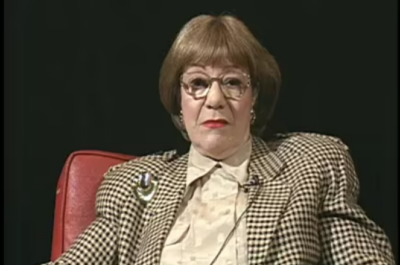Laure Wittner grew up in a large and inviting home in Berlin. Her parents, who were very active in Berlin’s cultural life, often hosted fundraising events for local Jewish artists. After Hitler came to power in 1933, Laure was sheltered from most antisemitic abuse. But she still remembered the pain of learning that she would no longer be allowed to play with her non-Jewish friends.
Nazi party officials instigated a vicious anti-Jewish pogrom in Germany and Austria on November 9, 1938. For Laure’s family and for thousands of other Jews, the pogrom—known as Kristallnacht, the Night of Broken Glass—was the turning point, the moment when they realized that life was no longer tenable in Nazi territory. Laure’s father, a factory owner, was in Holland on business when violence struck so he stayed there. Laure’s mother closed the factory, rented out their elegant apartment and fled. She and Laure made it as far as Belgium, where they lived with relatives for the next 18 months.
On the morning of May 10, 1940, Laure awoke to the sounds of airplanes and bombs. The German invasion of Western Europe had begun. Once again, Laure and her mother took flight. This time they headed to Paris with Laure’s aunt and uncle. En route the group was arrested, placed in a sealed cattle car and sent to the south of France. The involuntary journey was filled with discomfort and uncertainly, but it may have saved their lives; when the doors of the car were opened they found themselves in Cierp, a town in the part of France that remained nominally independent. They were safe until Germany overran southern France in November 1942.
Soon after, Laure and her mother were arrested and interned at Vernet, a camp where the armed guards were always “ready to shoot.” Next, they were sent to Rivesaltes, a huge transit camp near the Mediterranean coast. There, Laure met a rabbi who helped her escape. She spent the next year in the Abbé Glasberg home, a refuge for Jewish children, and subsequently made her way to Nice where she was briefly reunited with her aunt and uncle. The southwest corner of France, including Nice, was occupied by Italian forces. Laure is still grateful to them for issuing a certificate that kept the French police at bay. But after the Allies signed an armistice with Italy in September 1943, Germany occupied southwest France and Laure was no longer safe. She moved on to Monte Carlo, Monaco where she joined the Resistance. Her assignment was to smuggle food and fake identity cards to about thirty Jewish families in hiding. Germany had occupied Monaco in 1943 and Laure’s only protection was a set of false papers that identified her as a non-Jewish French citizen.
After the war, Laure returned to France and later to Belgium. Although her mother survived the war, she learned that her father had not. Laure was working at the United States Embassy in Brussels when she met her future husband, an American. They married and settled in Texas in 1955. Although Laure received no formal schooling after the age of 12, she educated herself and established a successful career, working in the office of the president at the University of Texas and at MD Anderson Cancer Center.
Parents
Manfred Greiffenhagen, d. Dachau
Sophie Hopenfeld Greiffenhagen, survived


